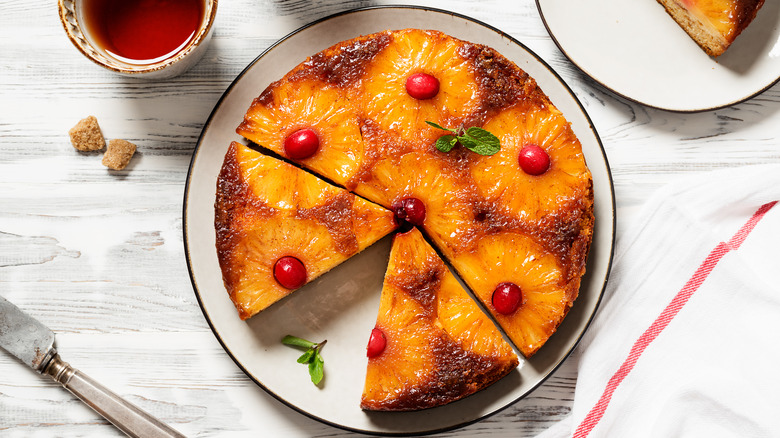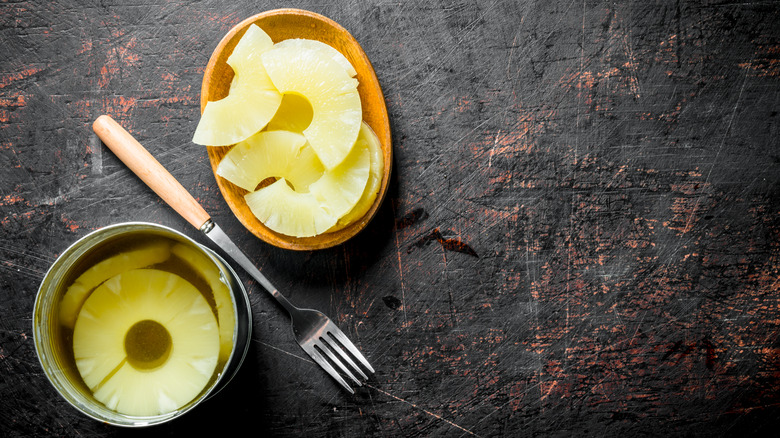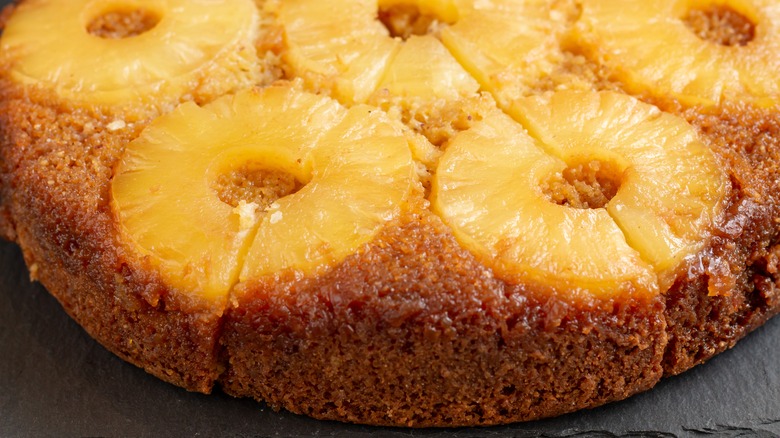Why Canned Pineapple Is Your Best Bet For Upside-Down Cake
Though you can technically make an upside-down cake with any type of fruit, pineapple is perhaps the most iconic version of the dessert. Not only do the pineapple rings give the cake an eye-catching pattern, but the natural sweetness of the fruit replaces the need for frosting altogether. Upside-down cakes — or skillet cakes, as they were initially called — have been around since the 1800s. But back then, apples and cherries were the most common fruits used. Recipes for pineapple upside-down cake didn't start appearing until the 1920s, and they almost exclusively called for canned pineapple.
It's hard to say who invented the pineapple upside-down cake, but it's easy to pinpoint who popularized it. As part of a marketing campaign for its new product, the Hawaiian Pineapple Company, now Dole, held a widely publicized recipe contest, asking customers to come up with a dessert starring canned pineapple. After receiving 2,500 different recipes for pineapple upside-down cakes, one of which was chosen as the winner, Dole went on to promote its canned pineapple as the key ingredient in this now-ubiquitous, once-novel treat. Most modern recipes still call for canned pineapple, but it isn't only because of tradition.
Canned pineapple versus fresh
Considering fresh pineapple is much easier to come by now than it was in the 1920s, you might assume that the recipe would be improved by replacing the canned fruit in favor of fresh fruit. The truth is that canned pineapple is the better option in terms of taste and texture. All canned fruit, including pineapple, is cooked, and when pineapple cooks, it gets sweeter. Pineapple upside-down cake made with canned pineapple, therefore, isn't as tart or sour as one made with fresh pineapple.
Though it sits at the bottom of the pan as it bakes, pineapple actually affects the texture of the cake too. While fresh pineapple is naturally juicy and continues to release even more juice as it cooks, canned pineapple leans more syrupy. What that ultimately means is that instead of soaking into the surface of the cake and making it mushy, canned pineapple creates a layer of caramelization.
Substituting fresh pineapple for canned in upside-down cake
If you only have fresh pineapple on hand and want to make a pineapple upside-down cake, the good news is that you can pretty easily substitute it as long as you make a few necessary adjustments. Most pineapple upside-down cakes call for adding pineapple juice directly into the cake batter, but since fresh pineapples already contain extra juice, you can skip this step in order to prevent the cake from turning soggy. Patting the pineapple slices dry with a paper towel can also help.
A more effective option is to just cook the pineapple. Because canned pineapple comes cooked, the best way to replicate the flavor and texture is simply to give your fresh pineapple a quick sauté until it starts to resemble the canned kind. Just make sure the fruit isn't too hot when you transfer it to your cake pan. Otherwise, it might start to cook any batter it comes in contact with prematurely. With this method, you won't have to modify any other parts of the recipe, and you'll still have a tasty pineapple upside-down cake.


